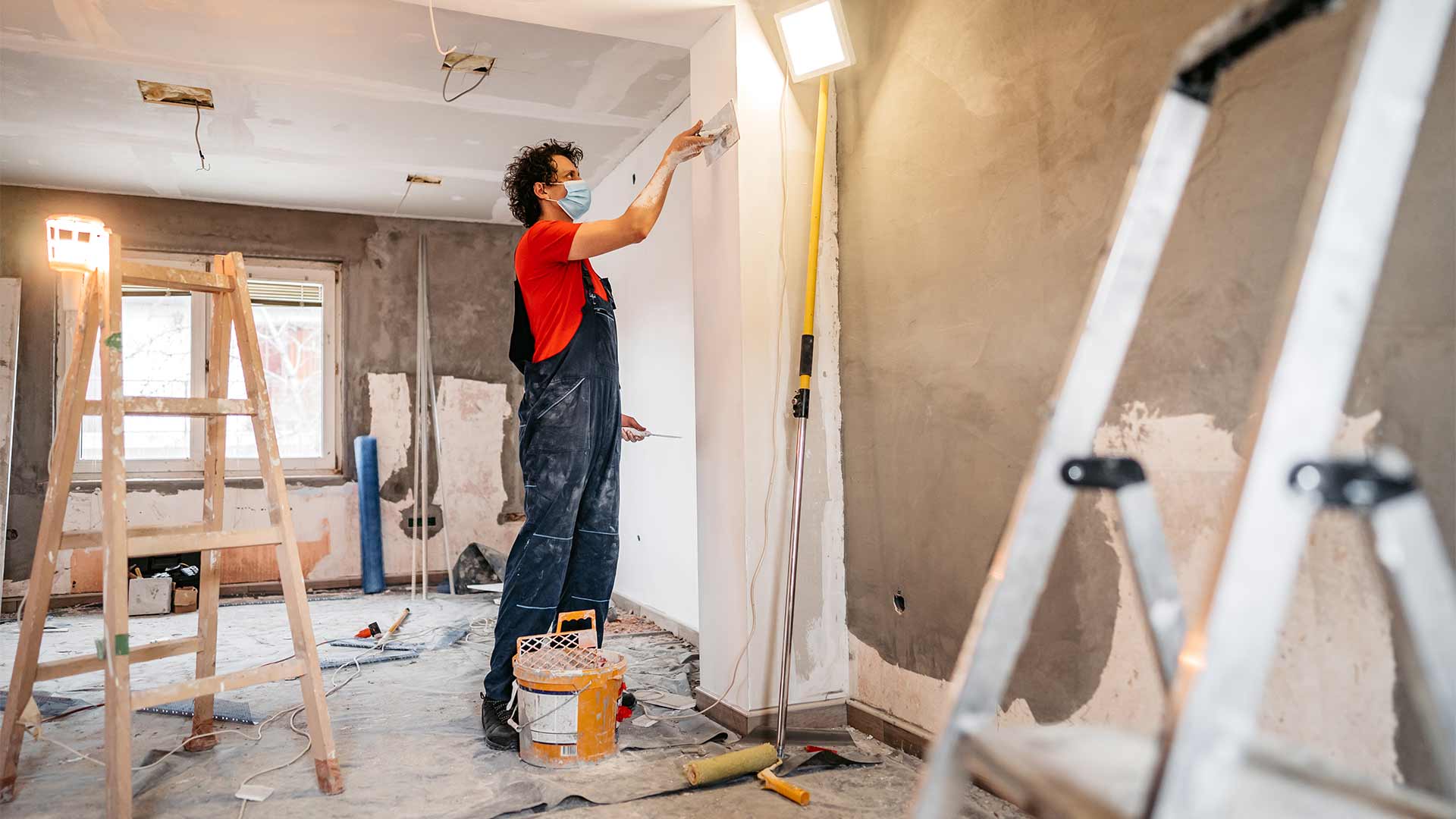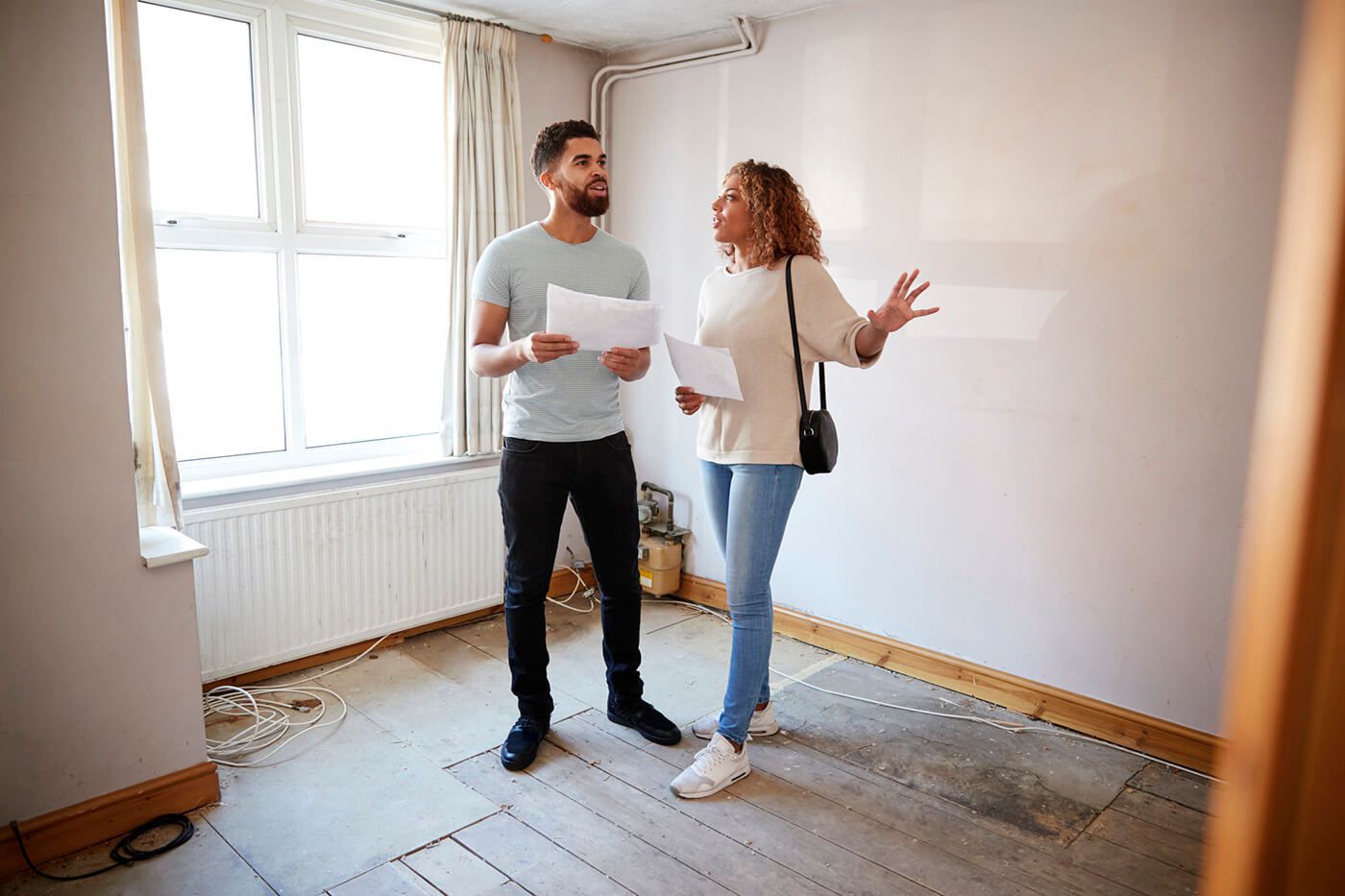

Finance
How To Buy A House In Texas With Bad Credit
Published: January 8, 2024
Looking to buy a house in Texas but have bad credit? Discover the finance options available to you and learn how to overcome credit challenges for home ownership.
(Many of the links in this article redirect to a specific reviewed product. Your purchase of these products through affiliate links helps to generate commission for LiveWell, at no extra cost. Learn more)
Table of Contents
- Introduction
- Understanding Bad Credit
- The Impact of Bad Credit on Buying a House in Texas
- How to Improve Your Credit Score
- Researching Loan Programs for Buyers with Bad Credit
- Saving for a Down Payment
- Finding a Real Estate Agent Experienced in Working with Buyers with Bad Credit
- Getting Pre-Approved for a Mortgage
- Exploring First-Time Homebuyer Programs in Texas
- Searching for Affordable Homes
- Understanding the Mortgage Process for Buyers with Bad Credit
- Making an Offer on a House with Bad Credit
- Negotiating with Sellers and Lenders
- Closing on Your Home
- Final Thoughts
Introduction
Buying a house is a significant milestone in many people’s lives. It provides stability, a sense of ownership, and the opportunity to build wealth over time. However, if you have bad credit, you may believe that homeownership is out of reach. The good news is that buying a house in Texas with bad credit is still possible.
Having bad credit is often the result of past financial mistakes or unforeseen circumstances. It may have been caused by a job loss, medical expenses, or simply poor financial management. Whatever the reason, it’s important not to lose hope.
In this article, we will explore the impact of bad credit on buying a house in Texas and provide practical tips to help you navigate the process. We will discuss ways to improve your credit score, research loan programs for buyers with bad credit, save for a down payment, find a real estate agent experienced in working with buyers with bad credit, and more.
While bad credit can present challenges, it doesn’t need to define your homeownership journey. With the right strategies and determination, you can overcome hurdles and achieve your dream of owning a house in Texas.
Understanding Bad Credit
Before we dive into the specifics of buying a house with bad credit, it’s important to have a clear understanding of what bad credit actually means. Bad credit is a term used to describe a low credit score that indicates a higher risk for lenders when it comes to borrowing money.
Your credit score is a numerical representation of your creditworthiness. It is calculated based on various factors including your payment history, credit utilization, length of credit history, types of credit, and new credit applications. The most commonly used credit score model is the FICO score, which ranges from 300 to 850. A score below 580 is generally considered to be in the “poor” or “bad” credit range.
Having bad credit can make the home buying process more challenging. Lenders are hesitant to approve loans to individuals with bad credit because they perceive them as higher risk borrowers. This means you may face higher interest rates, stricter loan terms, or even difficulty in obtaining a loan at all.
It’s important to note that bad credit doesn’t have to be a permanent situation. With discipline, patience, and a proactive approach, you can take steps to improve your credit score over time. In the next section, we’ll discuss various strategies to help you boost your creditworthiness and increase your chances of getting approved for a mortgage.
The Impact of Bad Credit on Buying a House in Texas
Having bad credit can have a significant impact on your ability to buy a house in Texas. Lenders consider a borrower’s creditworthiness when determining their eligibility for a mortgage, which means a low credit score can affect your chances of getting approved for a loan.
One of the most significant ways bad credit can impact the home buying process is through higher interest rates. Lenders may offer higher rates to borrowers with bad credit to offset the perceived risk. This means you may end up paying thousands of dollars more in interest over the life of your mortgage.
Another challenge you may face is stricter loan terms. Lenders may require a higher down payment, impose stricter debt-to-income ratio requirements, or ask for additional documentation before approving your loan.
It’s worth mentioning that bad credit doesn’t necessarily mean you won’t be able to buy a house at all. There are loan programs available specifically for borrowers with bad credit or low-income individuals. These programs may have more lenient eligibility criteria and offer more favorable terms.
However, it’s essential to note that even with these programs, buying a house with bad credit may limit your options. You may need to adjust your expectations, consider more affordable neighborhoods or properties, or be prepared to make compromises in terms of features or location.
In order to navigate the process successfully, it’s crucial to be aware of your credit situation and take proactive steps to improve it. In the next section, we’ll discuss specific strategies to help you improve your credit score and increase your chances of buying a house in Texas.
How to Improve Your Credit Score
If you have bad credit and want to buy a house in Texas, it’s important to take proactive steps to improve your credit score. While this may take time and effort, it can significantly increase your chances of getting approved for a mortgage and securing favorable terms. Here are some strategies to help you improve your credit score:
- Pay your bills on time: Late payments can have a major negative impact on your credit score. Make sure to pay all your bills, including credit card payments, loans, and utilities, on time.
- Reduce your debt: High levels of debt can negatively impact your credit score. Create a budget and prioritize paying down your debts, starting with high-interest debts first.
- Manage your credit utilization: Try to keep your credit card balances below 30% of your available credit limit. High credit utilization can lower your credit score.
- Monitor your credit report: Regularly check your credit report for errors or discrepancies. If you find any, dispute them immediately with the credit bureau.
- Build a positive credit history: If you don’t have much credit history, consider applying for a secured credit card or becoming an authorized user on someone else’s credit card to start building a positive credit history.
- Avoid opening new credit accounts: Opening multiple new credit accounts within a short period of time can negatively impact your credit score. Only apply for new credit when necessary.
- Keep old accounts open: Closing old accounts can shorten your credit history and lower your credit score. Keep your oldest accounts open and use them occasionally to maintain a positive credit history.
Improving your credit score takes time, commitment, and responsible financial management. Be patient and stay focused on your goal of buying a house in Texas. As your credit score improves, you’ll be in a better position to secure a mortgage with more favorable terms.
Researching Loan Programs for Buyers with Bad Credit
If you have bad credit, it’s important to research and explore loan programs specifically designed for buyers in your situation. These programs may have more lenient eligibility criteria and offer more favorable terms, making homeownership a possibility for you. Here are some loan programs to consider:
- FHA Loans: The Federal Housing Administration (FHA) offers loans that are more accessible to borrowers with lower credit scores. The minimum credit score requirement for an FHA loan is typically lower than conventional loans, making it a popular choice for buyers with bad credit.
- VA Loans: If you are a veteran, active-duty service member, or surviving spouse, you may be eligible for a VA loan. These loans are guaranteed by the U.S. Department of Veterans Affairs and often have more flexible requirements, including lower credit score thresholds.
- USDA Loans: The U.S. Department of Agriculture (USDA) provides loans for eligible rural homebuyers. These loans offer flexible credit requirements and attractive interest rates, making them a viable option for buyers with bad credit in rural areas.
- State and Local Programs: Many states and local authorities offer loan programs or down payment assistance programs specifically tailored for low-income or first-time homebuyers. These programs often have more relaxed credit score requirements and provide financial assistance to help you qualify for a mortgage.
- Non-Conventional Loans: There are also non-conventional loan programs available, such as subprime loans or portfolio loans, which are designed for borrowers with less-than-perfect credit. These loans may come with higher interest rates or stricter terms, so it’s important to carefully consider the terms and evaluate your ability to repay.
When researching loan programs, it’s important to carefully review the eligibility criteria, terms, and interest rates. Compare different programs and lenders to find the one that best suits your needs and financial situation.
Keep in mind that while these loan programs may provide opportunities for buyers with bad credit, it’s still important to work on improving your credit score. A higher credit score can open up more options and lead to more favorable terms and lower interest rates.
Saving for a Down Payment
When it comes to buying a house in Texas with bad credit, saving for a down payment is a crucial step. A down payment is a percentage of the total purchase price that you pay upfront, and it plays a significant role in the mortgage approval process.
While it may seem daunting to save for a down payment, especially if you have bad credit, it is not impossible. Here are some strategies to help you save for a down payment:
- Create a budget: Assess your income and expenses to determine how much you can realistically set aside each month for savings. Cut back on non-essential expenses to free up additional funds.
- Automate your savings: Set up automatic transfers from your paycheck or checking account to a separate savings account dedicated to your down payment. This makes saving more effortless and ensures you consistently contribute.
- Explore down payment assistance programs: Research local, state, or federal down payment assistance programs that may be available to help you with your down payment. These programs may offer grants, loans, or other forms of financial assistance.
- Consider alternative sources of funds: Look into options such as receiving a gift from a family member, withdrawing funds from your retirement account (if eligible), or using proceeds from the sale of assets to supplement your down payment savings.
- Set realistic goals: Determine how much you need for a down payment and set realistic goals based on your income and savings capacity. Remember that a larger down payment can help offset the impact of bad credit and potentially secure better loan terms.
- Monitor your progress: Regularly track your savings progress and celebrate milestones along the way. This will help keep you motivated and focused on your goal.
Remember, the larger your down payment, the lower your loan-to-value ratio (LTV) will be. A lower LTV can help offset the impact of bad credit and increase your chances of getting approved for a mortgage.
While saving for a down payment may require discipline and patience, it is an essential step towards achieving homeownership. Start early, stick to your savings plan, and you’ll be one step closer to buying a house in Texas.
Finding a Real Estate Agent Experienced in Working with Buyers with Bad Credit
When buying a house with bad credit in Texas, having a real estate agent who is experienced in working with buyers in similar situations can make a significant difference. An agent with expertise in navigating the challenges of bad credit can provide valuable guidance and support throughout the home buying process. Here are some tips to help you find the right real estate agent:
- Ask for recommendations: Start by asking friends, family, or colleagues who have recently purchased a home for recommendations on real estate agents who are familiar with working with buyers with bad credit.
- Do your research: Take the time to research local real estate agents who specialize in working with buyers with bad credit. Look for agents who have a proven track record of successfully helping buyers in similar financial situations.
- Interview multiple agents: Schedule consultations with several real estate agents to discuss your specific needs and gauge their experience and understanding of the challenges associated with bad credit. Ask about their knowledge of loan programs for buyers with bad credit and their strategies for helping clients overcome obstacles.
- Check online reviews: Read online reviews and testimonials from past clients to get a sense of their experiences working with the real estate agents you’re considering. Look for positive feedback specifically regarding their ability to navigate the home buying process with bad credit.
- Ask about their network: Inquire about the agent’s network of mortgage lenders, credit repair specialists, and other professionals who can provide assistance in improving your credit and securing a mortgage with favorable terms.
- Communication and rapport: Pay attention to the agent’s communication style and rapport during your initial meetings. It’s essential to work with someone who communicates effectively, listens to your concerns, and shows a genuine interest in helping you achieve homeownership.
Remember, finding the right real estate agent is a crucial step in your home buying journey, especially when dealing with bad credit. Take the time to find an agent who understands your unique circumstances and can guide you through the process with empathy and expertise.
With a knowledgeable and experienced real estate agent by your side, you’ll have the support you need to overcome the challenges of bad credit and find a home that meets your needs and budget.
Getting Pre-Approved for a Mortgage
When buying a house in Texas with bad credit, getting pre-approved for a mortgage is a crucial step. Pre-approval not only gives you a clear understanding of your budget and the loan amount you may qualify for, but it also demonstrates to sellers that you are a serious buyer.
While it may be more challenging to get pre-approved with bad credit, it is not impossible. Here are some important steps to follow:
- Gather your financial documents: Before meeting with a lender, gather documents such as your tax returns, pay stubs, bank statements, and any other relevant financial information. These documents will help assess your financial situation and determine your eligibility.
- Research lenders specializing in buyers with bad credit: Look for lenders who have experience working with buyers with bad credit. They may be more understanding of your situation and offer loan programs tailored to your needs.
- Meet with a lender: Schedule an appointment with a lender who specializes in working with buyers with bad credit. They will review your financial documents, assess your creditworthiness, and discuss loan options that may be available to you.
- Provide accurate and complete information: Be honest and transparent about your financial situation, including any credit issues or challenges you may have faced. Providing accurate information will help the lender assess your eligibility more accurately.
- Work on improving your credit: While you’re in the process of getting pre-approved, continue to work on improving your credit score. Pay your bills on time, reduce your debt, and avoid applying for new credit until you have secured a mortgage.
- Understand the terms and conditions: Carefully review the terms and conditions of the pre-approval, including the interest rate, down payment requirements, and any other relevant details. Ask your lender to explain anything you don’t understand.
Getting pre-approved for a mortgage with bad credit may require more effort and patience, but it is an important step in the home buying process. It gives you confidence when making offers on homes and shows sellers that you are a qualified buyer.
Remember that pre-approval is not a guarantee of obtaining a loan. The actual loan approval will occur once you have chosen a specific property and the lender has reviewed all necessary documents. However, the pre-approval process provides you with the initial information and guidance to move forward with your home search.
Exploring First-Time Homebuyer Programs in Texas
If you’re a first-time homebuyer in Texas with bad credit, there are various programs available that can help make homeownership more accessible. These programs are specifically designed to assist first-time buyers and may offer financial assistance, down payment assistance, or favorable terms. Here are some first-time homebuyer programs to explore:
- Texas Department of Housing and Community Affairs (TDHCA): The TDHCA offers several programs aimed at providing affordable housing options for eligible low-income individuals and families. These programs can help with down payment assistance, closing cost assistance, or mortgage credit certificates.
- Homes for Texas Heroes Program: This program, offered by the TDHCA, provides competitive mortgage interest rates and down payment assistance for teachers, police officers, correctional officers, firefighters, and EMS personnel.
- Mortgage Credit Certificate Program (MCC): The MCC program allows first-time homebuyers to claim a tax credit for a portion of the mortgage interest paid each year. This can help lower the overall cost of homeownership.
- Texas State Affordable Housing Corporation (TSAHC): The TSAHC offers various homebuyer assistance programs, including down payment assistance grants, mortgage credit certificates, and affordable mortgage options specifically designed for low-income individuals and families.
- Federal Housing Administration (FHA) Loans: While not specific to Texas, FHA loans are a popular option for first-time homebuyers with bad credit. These loans offer flexible eligibility requirements and lower down payment options.
When exploring these programs, it’s important to carefully review the eligibility criteria, documentation requirements, and any income limitations. Some programs may have specific guidelines regarding credit scores or debt-to-income ratios, so it’s essential to determine if you meet the qualifications.
Additionally, work with a knowledgeable real estate agent or lender who has experience with these first-time homebuyer programs. They can guide you through the application process and help identify the programs that best suit your needs and financial situation.
By taking advantage of these first-time homebuyer programs, you can increase your chances of buying a house in Texas, even with bad credit. These programs provide valuable resources to help you achieve your dream of homeownership and create a solid foundation for your financial future.
Searching for Affordable Homes
When buying a house in Texas with bad credit, it’s important to focus your search on affordable homes that fit within your budget. Here are some strategies to help you find affordable homes:
- Set a realistic budget: Determine how much you can comfortably afford based on your income, expenses, and financial goals. Consider not just the purchase price of the home, but also the ongoing costs of homeownership such as property taxes, insurance, and maintenance.
- Research affordable neighborhoods: Explore different neighborhoods in Texas that have a lower cost of living or offer more affordable housing options. Look for areas where property values are lower but still have the amenities and conveniences you desire.
- Consider fixer-uppers: Look for homes that require some work or renovation. Fixer-uppers can often be purchased at a lower price and provide an opportunity to increase the value of the property over time.
- Expand your search: Consider looking beyond metropolitan areas to smaller towns or cities, as housing prices can be more affordable in these locations. Keep an open mind and explore areas that may have lower demand but still meet your needs.
- Consider alternative housing options: Explore alternative housing options such as condos or townhouses, which may be more affordable than single-family homes. These options can also offer lower maintenance responsibilities.
- Work with a real estate agent: Enlist the help of a real estate agent who is familiar with the local market and specializes in finding affordable homes. They can provide valuable insights, guide your search, and negotiate on your behalf.
- Stay informed: Regularly check real estate listings, online platforms, and attend open houses to stay updated on available properties in your target price range. Be proactive in your search and take advantage of opportunities as they arise.
Remember that finding an affordable home takes time and perseverance. Be patient in your search and trust that the right opportunity will come along. By focusing on affordability and being open to different options, you can increase your chances of finding a home that fits your needs and budget, even with bad credit.
Understanding the Mortgage Process for Buyers with Bad Credit
Buying a house in Texas with bad credit involves understanding the mortgage process and being prepared for the requirements and challenges that may arise. Here is an overview of the mortgage process for buyers with bad credit:
- Assess your creditworthiness: Before applying for a mortgage, assess your creditworthiness by reviewing your credit reports and scores. Understand where you stand and identify any areas for improvement.
- Research lenders: Look for lenders who specialize in working with buyers with bad credit and are familiar with loan programs that cater to this group. Compare interest rates, loan terms, and fees to find the best fit for your needs.
- Complete a mortgage application: Submit a mortgage application to your chosen lender. Provide accurate and detailed information about your income, employment history, debt, and assets.
- Prepare additional documentation: Expect to provide additional documentation, such as bank statements, pay stubs, tax returns, and proof of residency. The lender may request more detailed information to assess your ability to repay the loan.
- Undergo a credit check: The lender will conduct a credit check to evaluate your creditworthiness. They will consider factors such as your credit score, payment history, and outstanding debts.
- Receive a loan decision: Based on the information provided and your creditworthiness, the lender will make a decision on whether to approve your loan application. If approved, they will provide you with details on the terms, interest rate, and loan amount.
- Review the loan terms: Carefully review the loan terms, including interest rates, repayment period, and any additional fees. Ensure that you understand the terms and ask questions if anything is unclear.
- Consider a co-signer: If necessary, you may want to explore the option of having a co-signer with good credit. A co-signer can help strengthen your application and increase your chances of loan approval.
- Prepare for a higher interest rate: With bad credit, you may be offered a higher interest rate compared to borrowers with good credit. Be prepared for this possibility and factor it into your budget calculations.
- Make a down payment: Save for a down payment and be prepared to make a higher upfront payment. A larger down payment can help offset the impact of bad credit and improve your chances of getting approved.
- Close on the mortgage: Once the loan is approved, review the closing documents, sign the necessary paperwork, and pay any closing costs. This is the final step before officially becoming a homeowner.
It’s important to work closely with your lender throughout the process and be proactive in addressing any concerns or issues that may arise. With diligent preparation, understanding of the process, and the right support, you can navigate the mortgage process and make your dream of homeownership a reality despite having bad credit.
Making an Offer on a House with Bad Credit
Making an offer on a house with bad credit requires careful consideration and strategic planning. While bad credit can present challenges, it’s still possible to navigate the offer process successfully. Here are some key points to keep in mind:
- Be prepared: Before making an offer, ensure that you have a pre-approval letter from a lender. This shows sellers that you are a serious buyer and have taken steps to secure financing despite your credit challenges.
- Work with your real estate agent: Consult with your real estate agent and seek their guidance in determining a competitive offer price. They can provide valuable insights into market conditions and help you craft a compelling offer.
- Consider making a higher earnest money deposit: Offering a larger earnest money deposit can help demonstrate your commitment to the purchase and may make your offer more attractive to sellers.
- Include a personalized letter: Write a heartfelt letter to the sellers expressing your interest in their home. Share your story and highlight why you would be a responsible and trustworthy homeowner, despite your credit challenges.
- Be flexible: Consider being flexible with the terms of the offer, such as closing date or seller concessions. This can help make your offer more appealing to sellers, especially if there are competing offers.
- Promptly respond to counteroffers: If the sellers counter your initial offer, respond in a timely manner. Work with your real estate agent to negotiate the terms and find a mutually beneficial agreement.
- Consider seller financing: In some cases, sellers may be open to providing financing themselves. Explore the possibility of seller financing, which can be an alternative solution for buyers with bad credit.
- Be patient: Understand that the process may take longer when buying a house with bad credit. Be patient and remain optimistic while working towards your goal.
- Continue working on improving your credit: As you move forward with the offer process, continue taking steps to improve your credit. This can help expand your options in the future and potentially lead to better interest rates or refinancing opportunities down the line.
It’s important to be proactive, flexible, and realistic when making an offer on a house with bad credit. Working closely with your real estate agent and being prepared for potential challenges can help increase your chances of acceptance. Remember that sellers are primarily concerned with finding a qualified and committed buyer, and by showcasing your determination and commitment, you can still secure your dream home.
Negotiating with Sellers and Lenders
Negotiating with sellers and lenders is a crucial step when buying a house with bad credit. While bad credit may put you at a disadvantage, effective negotiation skills can help you overcome obstacles and secure a favorable outcome. Here are some tips for negotiating:
- Understand the market: Do thorough research on the local real estate market to gain insights into property values, recent sales, and current market conditions. This knowledge will empower you during negotiations.
- Be prepared to negotiate: Enter negotiations with a clear understanding of your budget, priorities, and limits. Determine your must-haves and areas where you can be flexible to find common ground.
- Work with a skilled real estate agent: Collaborate closely with your real estate agent, who can provide guidance, advise on negotiation strategies, and advocate for your best interests.
- Focus on the property’s condition and market value: Highlight any significant flaws or necessary repairs when negotiating with the seller. Use this information as leverage to negotiate for a lower purchase price or seller concessions.
- Offer a competitive but reasonable price: Craft an offer that aligns with the market value of the property. Avoid lowballing, as it may lead the seller to reject your offer outright.
- Request seller concessions: If the property requires repairs or updates, consider requesting the seller to contribute towards these costs or provide a credit at closing. This can help offset some of the expenses associated with purchasing a home with bad credit.
- Negotiate loan terms: If a lender expresses concerns about your credit history, try negotiating more favorable loan terms such as a lower interest rate, a smaller down payment requirement, or a higher seller concession to cover closing costs.
- Consider contingencies: Include contingencies in your offer, such as a home inspection or appraisal contingency, to protect yourself and give you the option to renegotiate or back out if there are any issues discovered during the process.
- Be patient and maintain open communication: Negotiations can be a back-and-forth process. Remain patient, respond promptly to counteroffers, and maintain open and respectful communication with the seller or their agent.
Keep in mind that negotiation outcomes may vary depending on the specific circumstances and market conditions. While bad credit may present challenges, demonstrating your commitment and willingness to work towards a mutually beneficial agreement can help you navigate the negotiation process effectively.
Closing on Your Home
The closing process is the final step in the home buying journey, where you officially become the owner of the property. Closing on a home with bad credit requires careful attention to detail and thorough preparation. Here’s what you need to know about the closing process:
- Review the closing disclosure: The closing disclosure outlines the final terms of your loan, including the loan amount, interest rate, closing costs, and any additional fees. Carefully review this document to ensure accuracy and address any concerns before moving forward.
- Have a home inspection: Before closing, schedule a home inspection to identify any potential issues or repairs needed. This will help you make an informed decision and negotiate any necessary repairs with the seller.
- Secure homeowner’s insurance: Prior to closing, obtain homeowner’s insurance to protect your investment. The lender will require proof of insurance before finalizing the loan.
- Complete the final walkthrough: Conduct a final walkthrough of the property to ensure that it’s in the agreed-upon condition and any necessary repairs have been made. This is your last chance to address any concerns before closing.
- Prepare necessary documentation: Gather all required documentation, such as photo identification, proof of insurance, and copies of contracts and agreements. Have these documents readily available for the closing process.
- Bring funds for closing costs: Prepare to bring the necessary funds to cover closing costs, which typically include fees for loan origination, appraisal, title search, attorney fees, and taxes. Review the closing disclosure to determine the exact amount required.
- Sign legal documents: During the closing, you will sign various legal documents related to the purchase, including the mortgage note, deed of trust, and any other paperwork required by the lender and the title company.
- Paying closing costs: Coordinate with the closing agent or title company to ensure that all necessary funds are properly transferred and distributed to pay off expenses such as down payment, closing costs, and outstanding fees.
- Receive the keys: Once all the paperwork is signed, funds are transferred, and the closing process is complete, you will receive the keys to your new home. Congratulations, you are now a homeowner!
Closing on your home can be an exciting, albeit complex, process. Working closely with your real estate agent, lender, and closing agent can help ensure a smooth and successful closing experience. Remember to ask questions, review all documentation carefully, and stay organized throughout the process.
Lastly, continue taking steps to improve your credit and demonstrate responsible financial management. Over time, your credit score may improve, providing you with more options and opportunities for refinancing or future home purchases.
Final Thoughts
Buying a house in Texas with bad credit may present challenges, but it’s important to remember that it is still possible to achieve your dream of homeownership. By taking proactive steps to improve your credit score, researching loan programs for buyers with bad credit, and working with professionals experienced in assisting buyers in similar situations, you can navigate the home buying process with confidence.
Remember to set realistic expectations, do thorough research, and be patient throughout the process. Homeownership is a significant long-term commitment, so it’s important to make informed decisions and ensure that the purchase aligns with your financial goals and capabilities.
Furthermore, continue to work on improving your credit even after you’ve purchased your home. Responsible financial habits and timely payments can help rebuild your credit over time, opening up opportunities for better interest rates and refinancing options in the future.
Lastly, don’t hesitate to seek guidance from professionals throughout the home buying process. Real estate agents, lenders, and other experts can provide valuable advice, support, and resources to help you make informed decisions and overcome obstacles along the way.
With determination, research, and a proactive approach, you can overcome the challenges of bad credit and successfully purchase a house in Texas. Remember, homeownership is an exciting milestone, and with the right strategies in place, you can achieve it regardless of your credit history. Good luck on your journey to homeownership!














